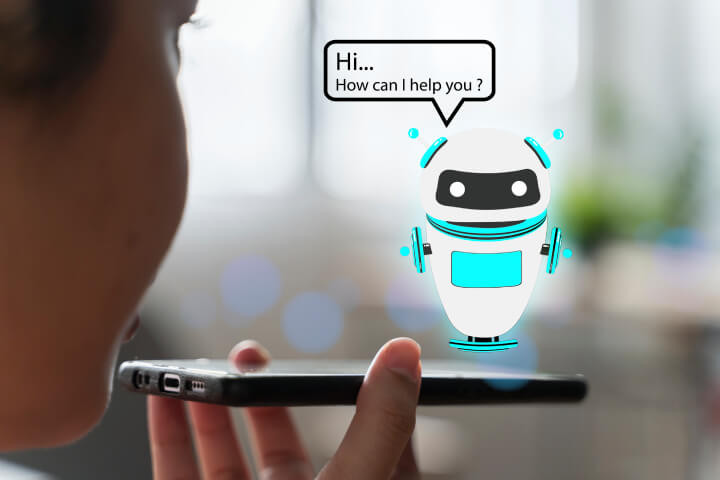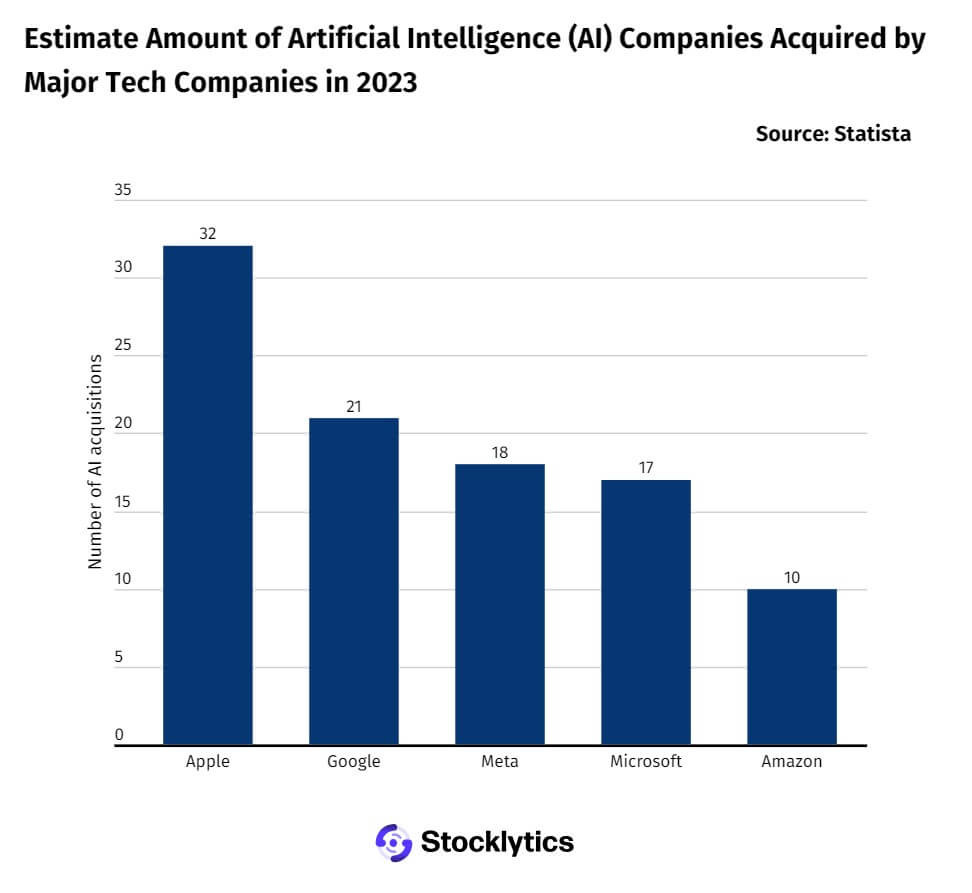Inside Apple AI Acquisitions: Shaping the Future of Technology
26-03-2024 | By Gary Elinoff

Key Takeaways about Apple and Artificial Intelligence:
- Apple's strategic AI acquisitions, including DarwinAI, signal a deeper integration of AI across its device ecosystem, enhancing user experience and privacy.
- In 2023 alone, Apple has made a significant leap in AI development, acquiring 32 AI startups to bolster its technological capabilities and competitive edge.
- Apple's focus on running AI on devices, rather than relying on cloud computing, aims to reduce latency and improve data security for its users.
- Collaboration with Google on Generative AI models could revolutionize iPhone capabilities, making Apple a silent yet formidable player in the AI space.
Introduction
Trendsetter Apple has lagged behind in the utilization of artificial intelligence (AI) in this brave new age of ChatGPT. This becomes especially apparent when the company is compared to rivals Samsung, Google and Microsoft. However, the company has begun to remedy this major omission, most recently with its purchase of Canadian AI startup DarwinAI.
In a move that's as strategic as it is bold, Apple's acquisition spree, including the notable pickup of DarwinAI, signals a deeper dive into the AI pool. It's not just about hoarding tech jewels; it's about weaving AI's transformative threads into the very fabric of Apple's ecosystem. Imagine your daily gadgets, only smarter, faster, and eerily intuitive. That's the future Apple is scripting with each acquisition, making every interaction with your device not just a transaction but a conversation.
And that’s not all. As reported in Stocklytics[1], Apple led the way in the acquisition of AI companies last year, with a total of 32 purchases.
With a shopping list that's as long as it is impressive, Apple's foray into AI acquisitions is a clear signal to the world: the future is now, and it's personalized. Each acquisition, from the likes of DarwinAI to the myriad others, is a building block in Apple's grand design to make our gadgets not just tools but partners. By marrying AI with its hardware, Apple is not just enhancing features; it's redefining the very essence of user experience, including privacy.

Image source: Stocklytics
Apple had no ready response to OpenAI’s 2022 blockbuster introduction of ChatGPT, but the iPhone giant now seems hell-bent on making up for lost time.
The DarwinAI Acquisition
DarwinAI acquisition appears to fit right in with one of Apple’s main AI trajectories which is, as reported by BNN Bloomberg[2], being “focused on running AI on devices rather than entirely in the cloud.” This meshes nicely with one of Darwin’s proven abilities in delivering “smaller and faster” AI systems – AI systems that won’t take up too much space in an iPhone, perhaps?
Apple's mantra with DarwinAI seems clear: make it smart, but keep it close. In an era where every millisecond counts, having an AI that can think on its feet (or chips, in this case) is not just an advantage; it's a necessity. This approach doesn't just trim the fat in terms of processing time; it ensures that your personal data doesn't take a detour through the cloud, marrying speed with security in a dance that's as elegant as it is efficient.
Other Apple AI Acquisitions
As reported in Appleworld.today[3], Stocklytics’ Edith Reads states that “By acquiring promising AI startups, Apple gains access to top-tier talent and innovative technologies and consolidates its foothold in crucial AI domains, ensuring a competitive edge in the rapidly evolving tech landscape.”
Other AI startups scooped up by Apple include:
- Voysis, with the intent to improve Apple’s Siri
- WaveOne for improved video compression
- Drive.AI
- Emotient
- AI.Music
- Laserlike
As reported in b2btechnologyzone[4], Apple’s next probable AI move is the acquisition of German based Brighter AI. The startup’s technology is expected to enhance user security for Apple’s $3,500 (plus) Vision Pro mixed reality headset.
With an eye on Brighter AI, Apple's not just buying technology; it's investing in a vision. A vision where mixed reality doesn't mean mixed signals when it comes to privacy. Brighter AI's prowess could be the key to unlocking a world where immersive doesn't imply invasive, ensuring that the future of mixed reality is not just vivid and vibrant but also private and protected. It's a bold step towards redefining the boundaries of technology, privacy, and ethics in the digital age.
Big Plans for iOS 18
Apple’s fast approaching operating system is reported to be heavily endowed with features that depend on Generative AI, which is itself at the core of ChatGPT. This fundamental AI technology can create pictures, text, videos and music based on the data sets it was trained on.
Generative AI, the wizard behind the curtain in Apple's upcoming iOS 18, is more than just a party trick. It's the cornerstone of a revolution that's set to redefine creativity, productivity, and play. By embedding this wizardry directly into the iPhone, Apple is not just cutting down on the latency; it's cutting the cord on conventional computing, making every interaction instantaneous, intuitive, and, dare we say, magical.
Apple’s plan to do as much of the AI processing right in the user’s phone is right in line with some important industrial trends. In our article[5] we discuss the many reasons why it’s advantageous to do as much of the data processing as close to the real-world interactions as possible. In manufacturing, that would be the factory floor. In cellular communications, it’s the user’s handset.
One reason is obvious, and that’s latency. It takes time for something to be observed on the factory floor, and reported to an AI server on the other side of the planet, and once the decision is made, for the response to get back to the factory. By then, it may be too late.
And for Apple’s iPhone users? Consider the case of an AI-powered game; the delay involved in waiting for decisions to arrive from AI servers located oceans away would completely destroy the flow of the game.
Installing the AI infrastructure right into the user’s iPhone, “where the rubber meets the road”, means no impossible delays for players enjoying AI empowered video games. New technologies such as Darwin’s “smaller and faster” might be just the ticket Apple needs to really take advantage of what AI can offer.
Apple’s AI Focus is Different from that of Its Rivals
As reported by CNBC[6], “While its rivals are focused on building stand-alone generative AI models, Apple has targeted machine learning infrastructure.” The article quotes PitchBook’s Brendan Burke, who states that “Apple looks at acquisitions of leading teams of talent in each domain that can bring the machine-learning techniques to particular consumer products.”
Apple is a largely consumer-centric company and is more concerned with Machine Learning modalities that it can readily deploy into its array of “watches, streaming music and television services, operating systems, and myriad mobile applications”, as well as the aforementioned Vision Pro mixed-reality headset.
Apple’s iPhone 15 and its Series 9 and Ultra 2 smartwatches already feature an array of AI capabilities.
An Expansion of Apple-Google Cooperation
As reported in the New York Times[7], Apple is negotiating with Google over the possibility of utilizing Gemini, Google’s Generative AI model. This will enable Apple iPhones to “to tap into the power of a large language model capable of analyzing vast amounts of data and generating text on its own.”
Though “rivals”, the two companies have a long history of collaboration. Examples include Apple’s use of Google Maps and the deal struck ensconcing Google’s search engine as the default choice for use in Apple’s Safari browser.
Google's AI chatbot, Bard, wasn’t well received as it didn’t fare well as compared ChatGPT, perhaps providing the inspiration for Apple to search from an outside, yet familiar provider for this vital capability.
Any deal will likely face regulatory scrutiny, as the deal for the Apple search engine to be Safari’s default has itself drawn the ire of regulators.
Challenges and Opportunities
AI is fast becoming a key component for smartphones. In order to avoid the myriad of problems associated with endless back and forths between cell phone and servers, as much of the tech as possible must reside in the handset. Fitting all the goodies into a handset weighing a few ounces will be a tremendous problem for all handset manufacturers, and not just Apple.
As we see over and over again throughout the electronic industry, no company, not even giants like Apple and Google can do it all. The challenge Apple will face will be maximizing the gains to be achieved from the three disparate inputs of Apple’s own internally generated AI with what can be gained from outsiders like Google and in incorporating the influx of freewheeling startups that now must be absorbed.
Wrapping Up
In implementing AI, Apple will follow three complementary pathways. It will develop AI capabilities on its own, it will buy and absorb AI startups, and it will cooperate with “frenemies” like Google. And, aside from monetary gains, if the deal involving Google’s Gemini goes through, Gemini will land on an installed base of two billion iPhones located worldwide. As stated in a Times article[7], “Virtually overnight, Google could have more consumers using its AI than its chief rival, OpenAI, which makes ChatGPT — making a pact with Apple a tantalizing prospect.”
References:
- Apple Sets New Record: Acquires 32 AI Startups in 2023, the Highest Among Major-Tech Companies: https://stocklytics.com/content/apple-sets-new-record-acquires-32-ai-startups-in-2023-the-highest-among-major-tech-companies/
- Apple buys Canadian AI startup as part of race to add features: https://www.bnnbloomberg.ca/apple-buys-canadian-ai-startup-as-part-of-race-to-add-features-1.2046964
- STOCKLYTICS: APPLE ACQUIRED 32 AI STARTUPS DURING 2023: https://appleworld.today/stocklytics-apple-acquired-32-ai-startups-during-2023/
- Apple's Move to Acquire AI Startup Brighter AI to Enhance Vision Pro Privacy Features: Report: https://www.b2btechnologyzone.com/apple-move-to-acquire.php
- What is Edge Computing? The Future of Real-Time Data Processing: https://www.electropages.com/blog/2023/10/edge-computing-electronics-leading-front
- How Apple’s thinking about AI spending and deployment differs from Big Tech rivals: https://www.cnbc.com/2023/11/01/how-apples-ai-spending-and-deployment-differ-from-big-tech-rivals.html
- Apple and Google Are Discussing a Deal to Bring Generative AI to iPhones https://www.nytimes.com/2024/03/19/technology/apple-google-ai-iphone.html
Glossary of Key Terms:
- Generative AI. Creates pictures, text, videos and music based on the data sets it was trained on.
- Machine Learning. That part of AI devoted to enabling computers to learn and optimize processes without being specifically programmed.

